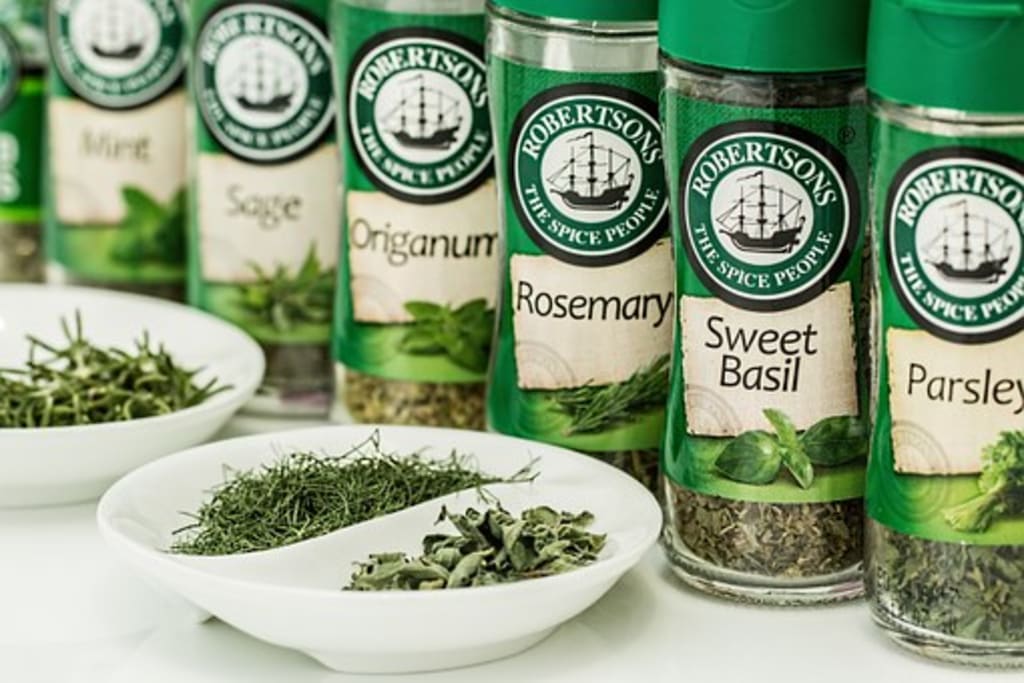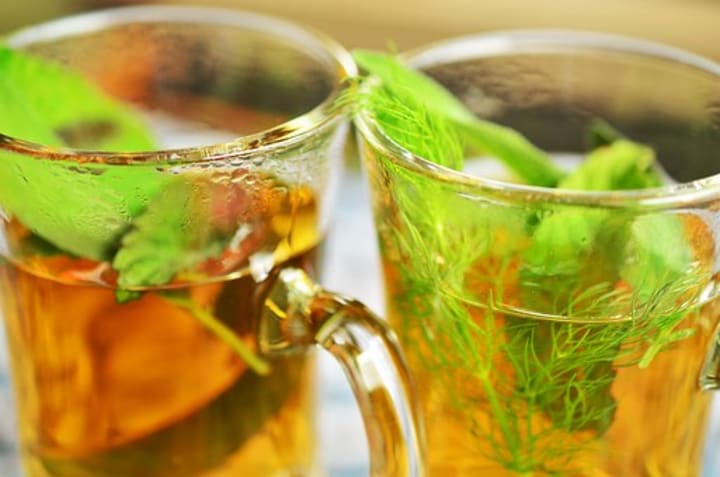The Wonderful World of Herbs
The Value in Herbs

You can find herbs in cooking and baking recipes and medicine. You cook with herbs to bring out the full flavor of foods. Include herbs every day in meals to heal the body.
Herbs are all around you.
Many people say they do not believe in herbs for medicinal treatments. If you deny using herbs, you probably did not know that you used herbs every day and did not even realize it. Herbs are useful for so many things, but you must remember that even all the right things in life, when misused, are not a good thing.
Ok, I hear you say,
"I do not use herbs for cooking because I do not know how to use them effectively."
"I take medicine because I do not believe in herbs for medicinal purposes."
Stop to think that when you use pure salt and pepper to flavor your foods, you are using herbs? Salt enhances the flavor of many foods. Your body needs a certain amount of salt. Salt is a good thing, but if you use too much salt too often, it can damage your body.
Cardiac and kidney patients must decrease the amount of salt in the diet. Too much sodium in your diet can increase your blood pressure, retain fluids in your feet and legs, and stress your kidneys. When used in moderation, salt makes good tasting foods taste better.
Herbs help us spice up the flavor of the foods we eat every day. Some herbs get us going in the morning, such as that first good cup of coffee. Herbs are full of medicinal qualities. Every herb on the planet has its unique history and story.
You may use these herbs every day and not realize where the herb originated. There are plant sources with healing and medicinal qualities in addition to those used to enhance the flavor of many foods. Herb use covers many centuries of exciting folklore and truth.
Don't take herbs for granted.

pixabay.com
Too much of anything good is not good for you.
Know appropriate amounts of healing herbs.
Do not get too comfortable with herbs, because as beneficial as they are in the body, they, like traditional medicines, have some potential hazards. Read and research what herbs are good for in the body. Know your limits and appropriate amounts. Too much of a good thing is never good, including herbs.
Another thing to remember is that herbs do not have all the nasty side effects of traditional medicine.
Many parts of the world cannot afford medicine or do not have access to modern medicine. These parts of the populace frequently use herbs for medicinal treatments.
Nearly five billion people world over use herbs for healing. There is a good share of today's medicine that formulates from them an herbal base. Digitoxin or Lanoxin is a pill prescribed by doctors to you if you have a faster than regular heart rate. This herb that slows the heart rate has its foundation from the foxglove herb.
Many times, we use herbs without ever recognizing it. When was the last time you enjoyed a coca-cola or that cup of coffee or tea? These are known stimulants that get us up and keep us going through busy days and nights. Kola is the herb.
In addition to being a stimulant, the drinks that we love so much are a potent decongestant. They help to prevent tooth decay. In the very beginning, sodas or carbonated beverages were herbal medicines.
Thousands of years ago, herbs played the only part in health because modern medicine as seen today did not exist and there was no such thing. Try some ginger tea as this tea is still a part of modern-day medicine.
The English developed ginger beer. Hundreds of years ago, ginger beer helped to settle an upset stomach. If you have ever had the flu, you probably sent a family member out for some Ginger Ale to calm your upset stomach. Ginger Ale, derived from ginger beer, is what we use today to help settle upset stomachs.
Years ago, coke was first developed to help take away a headache. Coke, derived from the herb kola nut, was used in the seventeenth century to treat respiratory problems. At one time, the medical community recommended that parents try giving their asthmatic child cola to help ward off asthma attacks.
Parsley Leaves

pixabay.com
Parsley for your palate?
When we eat in a restaurant, sometimes the chef will add a sprig of parsley to the side of the plate. Many think parsley is used to adorn and color the plate of food. The real reason parsley accompanies many restaurant plates is because parsley is full of chlorophyll.
Restaurant patrons should chew the parsley after completing their meal. Parsley is known to cleanse the teeth and freshen the breath. Next time you eat a meal in a restaurant and you find a bit of parsley on the side of the plate, see that it has a worthwhile purpose. Just do not toss it aside.
Restaurants are in the habit of leaving peppermints or mint chocolates with the bill. Mints are an ancient remedy to help settle stomachs after a meal. Mints are still used today as a medicinal stomach remedy. Essential peppermint oil rubbed on your belly when it is upset helps to take away the feeling of nausea.
One herb always in question is found mainly in Chinese cooking. MSG is routinely added to Chinese cuisine to enhance flavors. MSG is a known irritant causing many lovers of Chinese food a nasty headache. All you have to do when eating out at your favorite Chinese restaurant is to tell the waitress to hold the MSG in your food order. A few years ago there were so many complaints of headaches after eating Chinese food that some of these restaurants do not use MSG at all.
The truth is that herbs are in your life everywhere you turn. Herbs taken for health reasons have little if any side effects, unlike their counterpart synthetic medicines. Herbs are a food source, therefore have little to any known side effects. Side effects of taking herbs are possible but would be rare indeed.
Learn to use herbs for cooking.

pixabay.com
Fresh herbs enhance many foods.
Common Herbs Used in Cooking
Fresh herbs are the best to use. You can buy a high-quality herb in a jar, but the rule of thumb is that after one year you need to trash that jar and buy a new one. I prefer to keep a select few fresh herbs in my kitchen. When my recipe calls for the herb, I clip it and use it in my recipe. These kitchen herbs keep for many years.
- Basil
- Tarragon
- Dill
- Rosemary
- Mint
- Parsley
- Oregano
- Thyme
- Cilantro
- Chives
- Sage
Common Medicinal Herbs

pixabay.com
There are many ways in which to treat with herb therapy.
You can use herbs as topical salves, ointments, pastes, infusions in tea, chewed, and in essential oils are a few of the different ways people use medicinal herbs. The use of medicinal herbs takes a lot of reading, research, and study.
You may ask,
"If herbs are so good in medicinal medicines, why does not my doctor advocate for the use of herbs?"
I asked a doctor years ago why he did not order herbal remedies or treat with herbs that proved to have no side effects like traditional medicines. What he told me was profound enough for me to find a different doctor.
This doctor said,
"Herbal medicine is an entirely different ballgame for treating my patients rather than from traditional medicine. I do not have the time, patience, or motivation to learn something new."
These medicinal herbs can be grown in your kitchen to use at a moments notice or grown in pots outside or your flower garden. Some conditions that these herbs help ease are stress, headaches, colds, coughs, and indigestion. Some of the more common medicinal herbs also list as common herbs in cooking; they are as follows.
Medicinal Herbs
- Aloe Vera - Cut the leave and spread the liquid on burns, cuts, scrapes, scratches, and sunburns.
- Chamomile - Use the flowers of this plant as an infusion in teas for indigestion, colic, tension, and anxiety. Make a salve out of these flowers to heal skin inflammations.
- Echinacea - This plant is a known natural antibiotic. This herb decreases the signs and symptoms of the common cold and flu. It is known to increase your immunity.
- Feverfew - Suffering from arthritic pain, migraine headaches, frequent headaches or have any number of skin conditions, chew on a few leaves for relief.
- Lavender - This flower has a sweet and fresh aroma. This flower is proven to relax and calm your soul. Lavender, known as an antiseptic, helps to speed heal bruises, cuts, and scrapes. Lavender is known to enhance sleep.
- Parsley - Often restaurants place a sprig of parsley on the side of your plate. This herb not only adds color to your meal, but it is also known as the perfect breath freshener after your meal. Parsley decreases indigestion and gas. If you chew this herb, it takes the discomfort away.
- Lemon Balm - This herb is another one that is excellent for calming you. It works well on anxiety. This herb enhances sleep, decreases gas pains, and heals scratches and cuts. Lemon Balm helps to improve sleep and increase appetite.
- Marigold - Do you plant marigolds around your sidewalk or garden area? There are several different varieties of colors and blends of colors. This plant is an annual and die off in the fall months. The marigold is excellent for acne, facial blemishes, and helps to soothe a sunburn. Stomach ulcers and indigestion respond well to marigold.
- Peppermint - If you are bothered by a stomach ache or nausea, rub peppermint oil into your abdomen for relief. Make a peppermint tea to relieve indigestion or gas pains. Headaches respond well to this herb.
- Rosemary - This herb has a sweet name and sweet uses. Rosemary is proven to help your memory, increase concentration, and balance your mood. Use a bit of rosemary to help sweeten your breath.
- Sage - This herb is an essential element to your Thanksgiving Day turkey and dressing. Additionally, sage is a healing herb first used centuries ago by our ancestors to relieve any inflammations of the mouth or throat.
- Thyme - This herb is known as a potent antiseptic and shows relief from indigestion, gas, head and chest congestion, and nagging coughs.
- Basil - helps to increase appetite, decrease gas pains, helps to heal cuts
- St. John’s Wort - If you are one of the millions of people who suffer from depression, you probably have heard about the effectiveness of St. John's Wort. Centuries ago, our ancestors used the leaves and flowers to treat mood.
As safe as herbal remedies are you must speak to your doctor before the following.
- Never replace your current traditional medicines with herbal remedies.
- Never self-treat your medical conditions.
- Always speak with your doctor about your medications and their side effects.
- Never mix herbal remedies with traditional medicine unless you speak with your doctor first.
- Always get your doctor's approval if you want to treat with herbs.
About the Creator
Carolann Sherwood
Professional nurse for over 40 years
Owned a children's daycare, eight years
Owned an upper scale clothing resale shop
A freelance writer
Editor since 2010 on a writing platform site
A published author, "Return To The Past" available on Amazon






Comments
There are no comments for this story
Be the first to respond and start the conversation.